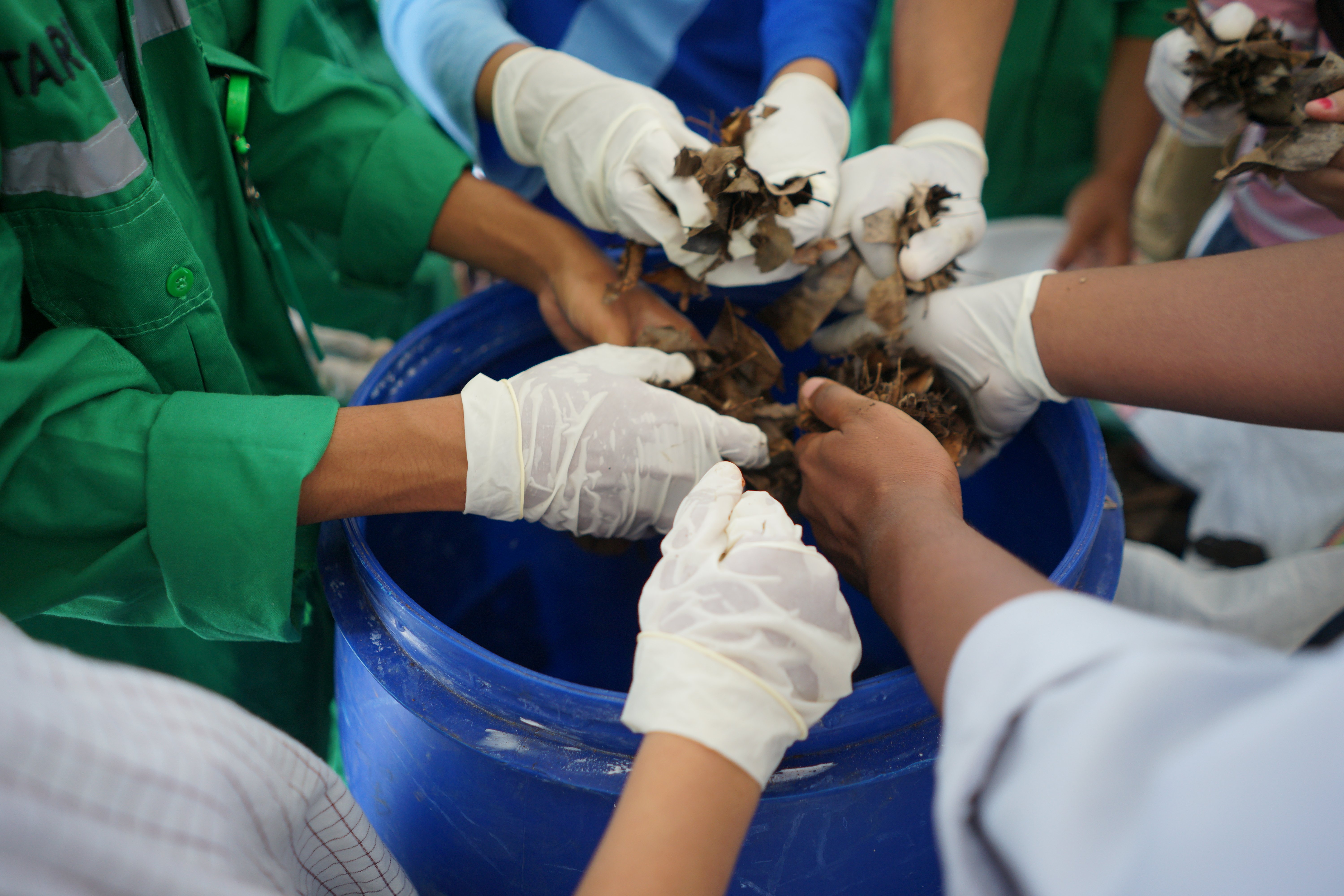Universitas Indonesia (UI) collaborates with its partners, namely Danone, the Children’s Lentera Foundation, and the Wakatobi Marine and Fisheries Community Academy, in the “My Garbage, My Responsibility (Samtaku)” learning activity in Central Java, Yogyakarta, and Wakatobi, Southeast Sulawesi. The Samtaku Team chaired by Dr. Cindy Rianti Priadi, S.T., M.Sc., lecturer at the Department of Civil Engineering, Faculty of Engineering UI (FTUI) in implementing a series of experience-based learning projects for responsible waste management.
“We chose Wakatobi as the pilot location for the implementation of the Samtaku program because this area has the Wakatobi Marine National Park which is the 3rd largest national park in Indonesia. The charm and beauty of the Wakatobi marine ecosystem should be preserved and protected. Samtaku activities in Wakatobi which are supported by the National Geographic Society are divided into three main activities, namely Training of Trainers (ToT) for Wakatobi youth, Teaching Factory Improvement at the Marine and Fisheries Community Academy (AKKP) Wakatobi, and Learning Sessions for junior high school students in Wakatobi.” said Dr. Cindy who is also a National Geographic Explorer.
The ToT activity aims to train 12 selected Wakatobi youths from 5 Wakatobi AKKP cadets, 5 members of the Wakatobi nature lover group, and 2 Forest Rangers from BTN Wakatobi. These 12 youths were trained to become trainers in the Learning Session activities for local junior high school students. Accompanied by the YLA and UI teams, the participants were provided with tips and tricks and simulations of learning activities to become good facilitators.
Teaching Factory Improvement activities at AKKP Wakatobi are ecobrick training and the installation of composting units and Torbi for organic waste processing. Dr. Cindy and the team from UI provided briefing to the lecturers and cadets of AKKP Wakatobi for two days to identify, create and assemble alternative technologies for processing organic and plastic waste.
On the first day, participants learned to process organic waste from the source using a composter and Torbi using Anaerobic Digester (AD) technology. With a composter, organic waste can be processed into compost, while with AD technology, organic waste can be processed into liquid fertilizer and biogas as clean energy to replace LPG. By entering organic waste weighing 3 kg per day into the Torbi reactor, optimally it can produce biogas equivalent to 23 kg LPG cylinders. In total, 10 composter units were successfully built and 1 AD unit was successfully installed.
On the second day, the participants attended training on making ecobricks, which is an alternative for processing plastic waste. Ecobricks are plastic waste bottles filled with pieces of used plastic waste from packaging until it is solid, be it soft ones like crackle bags or stiff ones like sachet packaging. The participants succeeded in making 20 ecobricks and then making them into modules that can be used, such as room decorations.
The Learning Session is the culmination of the entire series of activities in Wakatobi. The event was officially opened by the Wakatobi Regional Secretary attended by the Head of the Regional Apparatus Organization Service (OPD), the Wakatobi AKKP Director, the Head of the Management Section of Region 1 Wakatobi National Park, the principal and accompanying teachers from SMP 3 Wangi-Wangi Selatan, SMP-TQ Muadz bin Jabal, SMP 5 Wangi-Wangi, SMP 1 Wangi-Wangi Selatan, and SMP 1 Wangi-Wangi. 125 junior high school students from five different schools in the Wakatobi area participated in the study.
The trainers who have participated in the ToT introduce and guide junior high school students to participate in six games about responsible waste management according to the book “My Garbage, My Responsibility”. All six games become a learning activity with an interactive and educational approach that is expected to be able to instill a culture of reducing waste from the source.
“Through the vital role of local facilitators, this program is expected to continue to run and develop not only among junior high school students but also other levels of education. Not only among students but also other elements of society, and not only among those on Wangi-Wangi Island but throughout Wakatobi Regency and its surroundings. It is hoped that this program will be successful and be able to overcome the waste problem in Wakatobi so that it can become a model for other islands, regencies and cities to start introducing responsible behavior in waste management by prioritizing waste reduction at the source,” said the Dean of FTUI, Prof. Dr. Heri Hermansyah, ST., M.Eng., IPU.
The Samtaku activity was created by referring to the book “My Garbage, My Responsibility” which was jointly developed by UI, Danone, and YLA in a series of experience-based learning projects for responsible waste management. Samtaku activities in Wakatobi are supported by the Wakatobi Marine and Fisheries Community Academy (AKKP), Wakatobi National Park Center (BTN), and the Indonesian Ufuk Study Foundation (KUI) and will be held on 21-26 January 2022.
In addition to the Samtaku activities in Wakatobi, the Danone team, the Children’s Lentera Foundation (YLA), and the University of Indonesia (UI) also held a Webinar “My Garbage, My Responsibility” (Samtaku) to 120 elementary and junior high school teachers in Central Java and Yogyakarta. The webinar, which was held on July 21, 2022, aims to train teachers to deliver material on responsible waste management to students in a fun way.
***
Public Communication Bureau
Faculty of Engineering, Universitas Indonesia

